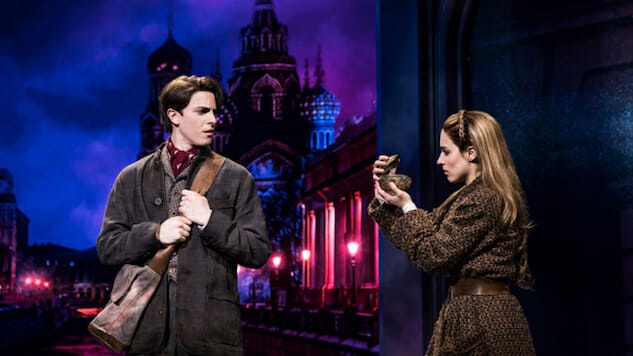Introducing Endless Mode: A New Games & Anime Site from Paste
Riding the waves of nostalgia-based entertainment, Anastasia holds true to its promise to take theatregoers on a “journey to the past,”—both by leaning on its Twentieth Century Fox source material as well as injecting some historical realism to the plot. Even without the appearances of a supernatural Rasputin or his talking bat, the show still sparkles with the magic of imperial Russia through mesmerizing visuals, glittering gowns and emotional performances. In actuality the production is based on both the 1997 animated film of the same name and the 1956 film starring Ingrid Bergman, and with the incorporation of Russia’s revolutionary history giving it more historical realism, the show becomes a well-rounded and established fairy tale.
The show is helmed by director Darko Tresnjak, who took the show from Hartford Stage (where he serves as artistic director) to Broadway’s Broadhurst Theatre this spring. Tresnjak brings a story of hope, resilience and perseverance to the stage without veering too far into sappiness; this production does not steer away from the harsh realities of the end of the Romanov empire and does not sugarcoat nor write around the brutality of revolution. With the book written by seasoned playwright Terrence McNally, the story of the last Romanovs, the Bolshevik revolution and subsequent beginnings of Soviet regime serve as a layered background to which the fantastical story of Anastasia’s survival acts as a shining light of hope in an otherwise harsh new reality.
Christy Altomare stars as Anya, a role to which she brings all the heart, vulnerability and strength required of a character plagued with amnesia and on the road looking for any trace of the family she can’t remember. The emotion she brings to the role is outstanding and artfully grounds a character involved in such an outlandish and seemingly impossible story. Derek Klena is charming, apathetic and determined as Dmitry, Anya’s con man turned love interest, whose get-rich-quick scheme to dupe the Dowager Empress with a faux Anastasia slowly melts his jaded outlook on life when it seems he’s stumbled upon the real deal.
The show opens with a brief history lesson in both the early 20th-century Romanov family as well as Anastasia’s relationship with her grandmother, the Dowager Empress—played by the incomparable Mary Beth Peil, who delivers on all fronts with grace, severity and anguish. In this sequence, the audience is watches as the Romanovs and their court dance gleefully, indulge in the finest things wealth has to offer and pose for royal photos. Linda Cho’s exquisite costumes bring imperial Russia to life, with the Tsarina’s glittering ball gown serving as a first taste of more opulence to come. However, the celebrations are soon interrupted by an uprising, and the beginning of the Bolshevik revolution is announced through vivid red imagery and violent bangs from offstage. The writing’s on the wall for the Romanovs as they’re rounded up, the stage cutting to black as young Anastasia shrieks with terror.
Ten years later, we see how much Russia has changed and are introduced to Leningrad, formerly St. Petersburg. It is here that we are introduced to this production’s answer to a more historically accurate antagonist: Gleb the Soviet officer and son of one of the guards tasked with killing the Romanovs in 1917. Ramin Karimloo plays Gleb with the quiet confidence, ambition and hunger required of a low-ranking officer hoping to live up to both his father’s legacy and what his country now requires of him. His mission to track down Anya and prevent any hope stemming from the rumors of a revived Anastasia played against his moral struggles with the Soviet regime provide more nuance to the villain role than that of the animated film’s evil sorceror.
John Bolton and Caroline O’Connor both serve as the show’s rambunctious comic relief: Bolton as Dmitry’s right-hand man and swindler of the elite class and O’Connor as the Dowager’s sassy lady in waiting, Countess Lily. O’Connor helps anchor the show’s second act with her commanding presence in the “Land of Yesterday” number, and she and Bolton play marvelously off one another as reunited lovers and schemers.
Anastasia as a whole thrives off of a familiar tale set to well-loved music—old songs and new written by Stephen Flaherty and Lynn Ahrens. Alexander Dodge’s scenic design of screen projections paired with physical props add depth to the show and allow the characters to travel the world onstage without too much suspension of disbelief. Of course there are minor setbacks; the constant repetition of the themes of hope and learning from the past tend to wear after a while, and the final confrontation between Anya and Gleb ends on an anticlimactic note that begs for some kind of symmetry between his plight and his father’s—which could have filled the hole as to how Anastasia escaped the firing squad she was fated to in the first place. But perhaps the ambiguity of their confrontation lends to the mysterious ending as a whole—maybe Anastasia was always meant to be a mystery that served as a seed of hope and comfort in a trying time in history.
Starring: Christy Altomare, Derek Klena, John Bolton, Ramin Karimloo, Caroline O’Connor and Mary Beth Peil
Book by: Terrence McNally
Music and Lyrics By: Stephen Flaherty & Lynn Ahrens
Director: Darko Tresnjak
Opened: Monday, April 24 at the Broadhurst Theatre.
